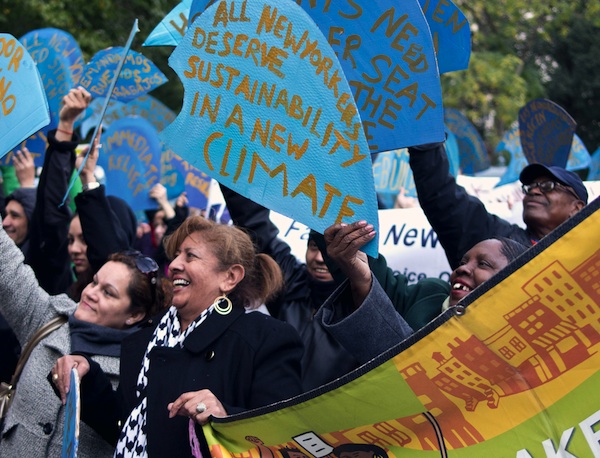Our leaders refuse to give carbon emissions the priority they deserve. It seems the rest of us must remind them of their responsibilities. [16 September 2014 | Peter Boyer]
Next Sunday I’m making yet another visit to MONA, Hobart’s wonderful Museum of Old and New Art. This time it’s not art that’s drawing me there, but an event on the other side of the world.
Next week’s New York climate summit has been touted by UN Secretary-General Ban Ki-moon as an opportunity for world political, business and civic leaders to announce the actions they plan to take to reduce emissions and to deal with climate change.
The UN aims to have 100 or more heads of state at its New York headquarters next Tuesday. The idea is to try to get some momentum in the lead-up to next year’s Paris conference, so that this landmark meeting in December 2015 achieves its ambitious goals with a minimum of fuss.
US President Barak Obama is expected to go to New York, but other key climate players will be missing. Among them are the leaders of China and India, respectively the world’s largest and third-largest carbon emitters, and Canada, whose present government regards climate policy as a mug’s game.
Canadian prime minister Stephen Harper and our own Tony Abbott declared a lot of common ground on climate policy when they met in June, so it will be no surprise to find Australia without a political representative at the meeting.
That will concern Australians and many others, but of greater global concern are the positions taken by the leading developing countries in the next year or so as preparations gather pace for a post-2020 global climate agreement, to replace the venerable Kyoto Protocol.
The key players here are four emerging nations calling themselves the BASIC group: Brazil, South Africa, India and the big one, China. Representatives of these countries met in India last month to thrash out their positions for Paris.
The outcome was a setback for countries in the developed world, including Australia. The BASIC countries declared themselves disappointed at what they saw as a lack of commitment among developed countries to help emerging countries develop effective carbon-abatement measures.
The Indian climate change minister, Prakash Javadekar, said after the meeting that “developed countries must walk the talk” after their 2009 commitment to provide developing countries with $100 billion a year by 2020 for mitigation and adaptation had failed to materialise.
Such is the political manoeuvring around international climate negotiations. But a much more substantial reason for all countries, developed and developing, to get serious about carbon abatement was disclosed in a UN report released last week on global emissions.
Last year saw the biggest increase in 30 years in the concentration of carbon dioxide in the air, the report said. At the year’s close, the carbon dioxide level was the highest ever recorded at 396 parts per million. At Hawaii’s Mauna Loa station the reading went above 400 ppm.
Our instrumental record for atmospheric carbon dioxide goes back only to 1958, but proxy data from ice cores, ocean sediments and other sources tell us that today’s level is higher than it’s been for at least 20 million years.
On top of this, last month a US research team published estimates that if all coal and gas power stations now existing or scheduled to be built operate for the average functioning life of 40 years, they will keep emissions at or above today’s levels for decades into the future.
Ban Ki-moon says that national leaders must respond to expert scientific advice on climate. The government says it acted on expert advice to send us to war, but it’s chosen to ignore advice from its chief scientist and all our scientific agencies that climate change demands our urgent attention.
Australia’s leaders talk a lot about national security but are silent on the most pressing issue of all. Like a scandal in the family, it seems climate and the high carbon intensity of our economy must never be mentioned. What are they frightened of?
Change will happen if a critical mass of people feels strongly enough to come out and declare publicly that their political leadership is failing them. Huge popular rallies forced an end to the Vietnam war. It can happen again.
The biggest climate rally ever is to be staged on Manhattan Island next Sunday, two days ahead of the UN summit. A mass march in the streets of central New York aims to tackle obstacles to effective climate measures while emphasising reasons for hope and possibilities for change.
Millions around the world will join the US effort to demand strong national actions to secure for our children and grandchildren a world safe from the ravages of climate change. At the time of writing over 100 events had been organised throughout Australia. This is democracy at work.
Hobart’s event to support the New York rally will be a public gathering and picnic on the lawns of MONA at Berriedale, beginning at 1 pm on Sunday. Other Tasmanian events are at Burnie Park (starting 1pm) and Train Park, Deloraine (12.30pm). More details at http://peoplesclimate.org

